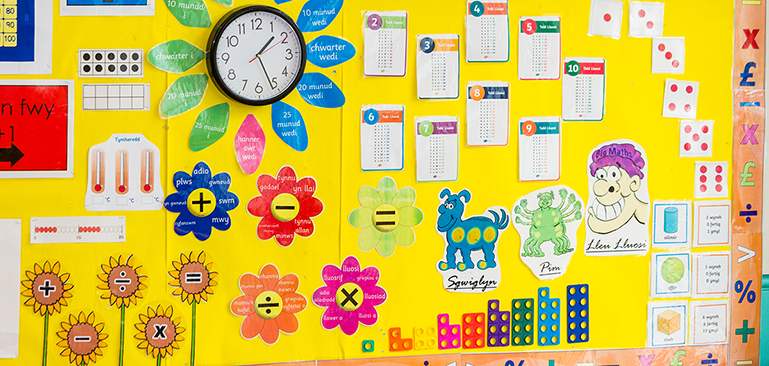Promoting the use of the Welsh language

Quick links:
Information about the school
Ysgol Gymraeg Bro Morgannwg is a designated Welsh-medium school that provides education for pupils from 3 to 19 years old. There are 1,250 pupils on roll, 168 pupils in Years 1 to 6 and 1,019 in Years 7 to 13. There are 147 pupils in the sixth form. Pupils from six other primary schools in the catchment area transfer to the secondary school in Year 7 and the school is situated in the town of Barry. Barry is not a traditionally Welsh-speaking area. Around 40% of pupils come from Welsh-speaking homes.
Context and background to the practice
Pupils and staff have a strong sense of pride in their Welshness and an appreciation of being part of a close-knit and caring Welsh community. Welshness and firm discipline are among the school’s main priorities. All members of staff have a clear duty and responsibility to promote and encourage the use of the Welsh language in all possible situations, whether at school or off-site on trips or visits. Teachers are reminded in joint sessions that they are all teachers of language, and most are effective language models who correct pupils’ language skilfully on a daily basis. This vision has been at the heart of the school since it was established, and hard work is undertaken to maintain high standards and expectations in terms of the use of the Welsh language.
Description of the nature of the strategy or activity
Provision to develop Welshness is at the heart of all of the school’s work. The ‘Welshness Committee’ has a very positive effect on promoting social use of the Welsh language across the school. In the primary department, teaching athletes from Team Wales to learn Welsh was a challenge and an unforgettable experience for pupils. ‘Language Mentors’ in Year 10 work closely with younger pupils to promote the use of the Welsh language as a way of life. Older pupils take their responsibilities seriously and work as mature role models when supporting younger pupils with literacy activities during morning sessions. They also conduct activities. This has a positive effect on pupils’ skills across the school and enriches their language. Discussing issues relating to language and Welshness, and maintaining standards, are also a focus for the School Council and the ‘Cabinet’.
‘Welshness Week’ is highly successful. Guest speakers and celebrities come to the school to discuss the language’s importance to them. This ignites pupils’ pride and enables them to see the language’s value and status. Activities include ‘gigs’, which are held in co-operation with agencies such as the Urdd. A group of pupils who present on the school radio station give a taste of their experiences and open pupils’ eyes to aspects of Welsh life that they have not experienced. ‘Language psychology’ sessions are held by teachers who attended Welsh-medium schools even though they did not come from Welsh-speaking homes themselves. Pupils are able to relate to their backgrounds and see the advantages of the Welsh language in the world of employment.
An exceptionally rich range of extra-curricular experiences is provided through various clubs, visits to the local area and beyond, and sports experiences. These experiences have a positive influence on pupils’ wellbeing, Welshness and motivation, and develop their social skills exceptionally well. There is a variety of activities that develop a sound awareness of Welsh culture and history, which includes studying myths and legends in lessons and an annual trip for key stage 4 to visit important places in Welsh history, which is organised by the Welsh department. The school Eisteddfod and Urdd Eisteddfod are a focal point of the school calendar.
What impact has this work had on provision and learners’ standards?
Comments from guest speakers and visitors to the school are extremely complimentary about the pupils’ use of the Welsh language in lessons and around the school. Visits and trips are a pleasure for teachers as pupils have so much pride towards the language. Praise from residential centres, such as Glan-llyn and Llangrannog, is extremely positive.